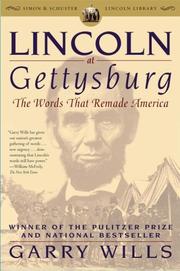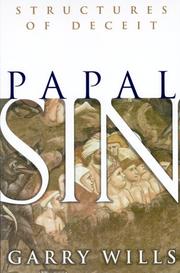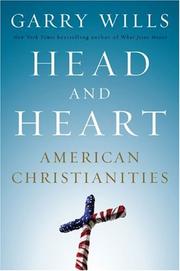| Listing 1 - 10 of 67 | << page >> |
Sort by
|
Book
ISBN: 9780691143576 0691143579 9786612976377 1782685553 1400838029 1282976370 9781400838028 0691217645 9781782685555 9781282976375 Year: 2011 Publisher: Princeton, N.J. : Princeton University Press,
Abstract | Keywords | Export | Availability | Bookmark
 Loading...
Loading...Choose an application
- Reference Manager
- EndNote
- RefWorks (Direct export to RefWorks)
In this brief and incisive book, Pulitzer Prize-winning historian Garry Wills tells the story of the Confessions--what motivated Augustine to dictate it, how it asks to be read, and the many ways it has been misread in the one-and-a-half millennia since it was composed. Following Wills's biography of Augustine and his translation of the Confessions, this is an unparalleled introduction to one of the most important books in the Christian and Western traditions. Understandably fascinated by the story of Augustine's life, modern readers have largely succumbed to the temptation to read the Confessions as autobiography. But, Wills argues, this is a mistake. The book is not autobiography but rather a long prayer, suffused with the language of Scripture and addressed to God, not man. Augustine tells the story of his life not for its own significance but in order to discern how, as a drama of sin and salvation leading to God, it fits into sacred history. "We have to read Augustine as we do Dante," Wills writes, "alert to rich layer upon layer of Scriptural and theological symbolism." Wills also addresses the long afterlife of the book, from controversy in its own time and relative neglect during the Middle Ages to a renewed prominence beginning in the fourteenth century and persisting to today, when the Confessions has become an object of interest not just for Christians but also historians, philosophers, psychiatrists, and literary critics. With unmatched clarity and skill, Wills strips away the centuries of misunderstanding that have accumulated around Augustine's spiritual classic.
Augustine of Hippo --- Christian saints --- Biography --- History and criticism. --- Augustine, --- Augustine. --- Augustine, --Saint, Bishop of Hippo. --Confessiones. --- Christian saints - Algeria - Hippo (Extinct city) - Biography - History and criticism. --- Christian saints - Algeria - Hippo (Extinct city) - History and criticism. --- Christian saints --Algeria --Hippo (Extinct city) --Biography --History and criticism. --- Religion --- Philosophy & Religion --- Christianity --- Saints --- Canonization --- RELIGION / Christianity / History. --- Academic skepticism. --- Adolf von Harnack. --- Ageless Wisdom. --- Anguish. --- Asceticism. --- Astrology. --- Augustine of Hippo. --- Autobiography. --- Being and Time. --- Bible. --- Bildungsroman. --- Book of Confessions. --- Book. --- Celibacy. --- Christian. --- Christianity. --- Church Fathers. --- Confessions (Augustine). --- Consciousness. --- Consecration. --- Creation myth. --- Criticism. --- Dasein. --- Donatism. --- Ecclesiology. --- Edmund Husserl. --- Examination of conscience. --- Existentialism. --- Explanation. --- Facsimile. --- False prophet. --- Forgetting. --- Gervasius and Protasius. --- Gifford Lectures. --- God. --- Goethe's Faust. --- Hannah Arendt. --- Hedonism. --- Henri Bergson. --- Hierius. --- His Family. --- Historicity. --- Historiography. --- Jacques Derrida. --- Jean-François Lyotard. --- Jean-Jacques Rousseau. --- John Colet. --- Late Antiquity. --- Lecture. --- Ludwig Wittgenstein. --- Manichaeism. --- Marian devotions. --- Martin Heidegger. --- Narrative. --- Neoplatonism. --- Noam Chomsky. --- On Memory. --- On the Trinity. --- Oral tradition. --- Parchment. --- Paulinus of Nola. --- Pelagianism. --- Pelagius. --- Perversion. --- Phenomenon. --- Philosopher. --- Philosophy. --- Plotinus. --- Postmodernism. --- Predestination. --- Psalms. --- Psychobiography. --- Rebecca West. --- Rebuke. --- Religion. --- Religious text. --- Renunciation. --- Rhetoric. --- Romanticism. --- Rundown (Scientology). --- Saint Monica. --- Scholasticism. --- Septuagint. --- Sermon. --- Shorthand. --- Simplician. --- Specific gravity. --- Superstition. --- Søren Kierkegaard. --- Tanakh. --- The Christian Community. --- The First Man. --- Theft. --- Theology. --- Thomas Aquinas. --- Thought. --- Thérèse of Lisieux. --- Treatise. --- Valentinian (play). --- Writing.
Book
ISBN: 9056173510 Year: 2001 Publisher: Amsterdam Balans
Abstract | Keywords | Export | Availability | Bookmark
 Loading...
Loading...Choose an application
- Reference Manager
- EndNote
- RefWorks (Direct export to RefWorks)
Book
ISBN: 9031718572 9025953247 Year: 2002 Publisher: Averbode Altiora
Abstract | Keywords | Export | Availability | Bookmark
 Loading...
Loading...Choose an application
- Reference Manager
- EndNote
- RefWorks (Direct export to RefWorks)
Christian church history --- Church government --- Papes --- Pausen --- Theologie --- Théologie --- #gsdb4 --- #GGSB: Kerkgeschiedenis (pausen) --- 262.13 --- machtsstructuren --- pausen --- katholieke Kerk --- waarheid (x) --- onrecht (x) --- C3 --- #GBIB:SMM --- Pausschap. Heilige Stoel. Vaticaan. Paus als soeverein --- Kunst en cultuur --- 262.13 Pausschap. Heilige Stoel. Vaticaan. Paus als soeverein --- 262.13 Papacy. Holy See. Vatican. Pope as sovereign --- Papacy. Holy See. Vatican. Pope as sovereign --- Paus --- Kerkgeschiedenis (pausen)

ISBN: 0385182864 Year: 1987 Publisher: Garden City, N.Y.
Abstract | Keywords | Export | Availability | Bookmark
 Loading...
Loading...Choose an application
- Reference Manager
- EndNote
- RefWorks (Direct export to RefWorks)
Internal politics --- United States --- United States of America
Book
ISBN: 0195088794 Year: 1995 Publisher: New York Oxford University Press
Abstract | Keywords | Export | Availability | Bookmark
 Loading...
Loading...Choose an application
- Reference Manager
- EndNote
- RefWorks (Direct export to RefWorks)
Shakespeare, William --- Literature and history --- Tragedy --- Witchcraft in literature --- Littérature et histoire --- Tragédie --- Sorcellerie dans la littérature --- History --- Histoire --- Shakespeare, William, --- Gunpowder Plot, 1605, in literature --- Jésuites dans la littérature --- Jesuits --- In literature --- Littérature et histoire --- Tragédie --- Sorcellerie dans la littérature --- Jésuites dans la littérature --- In literature.

ISBN: 0743299639 9780743299633 Year: 1992 Publisher: New York (N.Y.) Simon & Schuster
Abstract | Keywords | Export | Availability | Bookmark
 Loading...
Loading...Choose an application
- Reference Manager
- EndNote
- RefWorks (Direct export to RefWorks)
Abraham Lincoln's Gettysburg Address is viewed as one of the most influential speeches in American history. Wills examines both Lincoln and the Address in their historical and culture frame.
Redes. --- Lincoln, Abraham, --- Oratory. --- Verenigde Staten.

ISBN: 0385494106 9780385494106 Year: 2000 Publisher: New York: Doubleday,
Abstract | Keywords | Export | Availability | Bookmark
 Loading...
Loading...Choose an application
- Reference Manager
- EndNote
- RefWorks (Direct export to RefWorks)
Papacy --- Catholic Church --- #gsdb4 --- Holy See --- See, Holy --- Popes --- Church of Rome --- Roman Catholic Church --- Katholische Kirche --- Katolyt︠s︡ʹka t︠s︡erkva --- Römisch-Katholische Kirche --- Römische Kirche --- Ecclesia Catholica --- Eglise catholique --- Eglise catholique-romaine --- Katolicheskai︠a︡ t︠s︡erkovʹ --- Chiesa cattolica --- Iglesia Católica --- Kościół Katolicki --- Katolicki Kościół --- Kościół Rzymskokatolicki --- Nihon Katorikku Kyōkai --- Katholikē Ekklēsia --- Gereja Katolik --- Kenesiyah ha-Ḳatolit --- Kanisa Katoliki --- כנסיה הקתולית --- כנסייה הקתולית --- 가톨릭교 --- 천주교
Book
ISBN: 0297842811 Year: 1999 Publisher: London Weidenfeld and Nicolson
Abstract | Keywords | Export | Availability | Bookmark
 Loading...
Loading...Choose an application
- Reference Manager
- EndNote
- RefWorks (Direct export to RefWorks)

ISBN: 9781594201462 Year: 2007 Publisher: New York (N.Y.) Penguin
Abstract | Keywords | Export | Availability | Bookmark
 Loading...
Loading...Choose an application
- Reference Manager
- EndNote
- RefWorks (Direct export to RefWorks)
An examination of Christianity's place in American life through history, from the Puritans to the administration of George W. Bush. The struggle within American Christianity, historian Wills argues, has been between the head and the heart: reason and emotion, Enlightenment and Evangelism. 18th century America saw a religious revolution--an Enlightenment culture emerged whose hallmarks were tolerance for other faiths and a belief that religion was best divorced from political institutions. Wills shows how radical a departure this was, and shows the steps by which church-state separation was enshrined in the Constitution. He shows a repeating pattern in our history: a cooling of popular religious fervor, followed by an explosion in evangelical activity--generally during times of social transformation and anxiety--and then a backlash. Wills's message is to be vigilant against the triumph of emotions over reason, but to know that the tension between them is necessary, inevitable, and unending.--From publisher description.
Book
ISBN: 1283331799 9786613331793 0300178492 9780300178494 9780300152180 0300152183 Year: 2011 Publisher: New Haven, CT : Yale University Press,
Abstract | Keywords | Export | Availability | Bookmark
 Loading...
Loading...Choose an application
- Reference Manager
- EndNote
- RefWorks (Direct export to RefWorks)
Renaissance plays and poetry in England were saturated with the formal rhetorical twists that Latin education made familiar to audiences and readers. Yet a formally educated man like Ben Jonson was unable to make these ornaments come to life in his two classical Roman plays. Garry Wills, focusing his attention on Julius Caesar, here demonstrates how Shakespeare so wonderfully made these ancient devices vivid, giving his characters their own personal styles of Roman speech.In four chapters, devoted to four of the play's main characters, Wills shows how Caesar, Brutus, Antony, and Cassius each has his own take on the rhetorical ornaments that Elizabethans learned in school. Shakespeare also makes Rome present and animate by casting his troupe of experienced players to make their strengths shine through the historical facts that Plutarch supplied him with. The result is that the Rome English-speaking people carry about in their minds is the Rome that Shakespeare created for them. And that is even true, Wills affirms, for today's classical scholars with access to the original Roman sources.
Rhetoric, Renaissance. --- Renaissance rhetoric --- Shakespeare, William, --- Caesar, Julius --- Caesar, Caius Julius --- César --- Cesare --- Caesar, Gaius Julius --- Caesar, Gaius Iulius --- Caesar, Caius Iulius --- Caesar, C. Iuluis --- Caesar, C. Julius --- Caesar, Cajus Julius --- Caesar, G. J. --- Cäsar, Julius --- Cèsar, G. Juli --- Cèsar, Gai Juli --- Cesar, Gayo Julio --- César, Jules --- César, Julio, --- Cesare, C. Iulio --- Cesare, C. Julio --- Cesare, Caio Giulio --- Cesare, Gaio Giulio --- Cesare, Giulio --- Cezar, Juliusz --- Gaius Julius Caesar --- I︠U︡liĭ T︠S︡ezarʹ --- Julius Caesar --- Julius Caesar, Gaius --- Juliusz Cezar --- Kʻai-sa --- Kaisa --- T︠S︡ezarʹ, I︠U︡liĭ --- צעזר, יוליוס --- קיסר, יוליוס --- יוליוס, קיסר --- In literature. --- Rome
| Listing 1 - 10 of 67 | << page >> |
Sort by
|

 Search
Search Feedback
Feedback About UniCat
About UniCat  Help
Help News
News